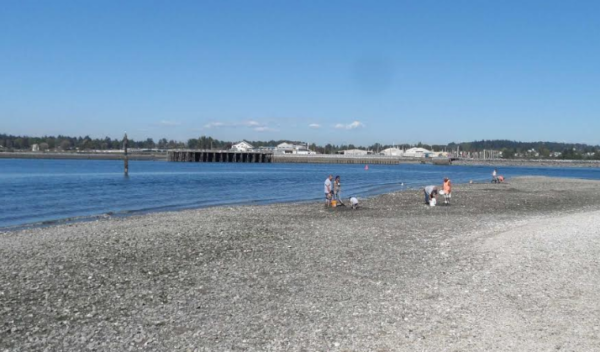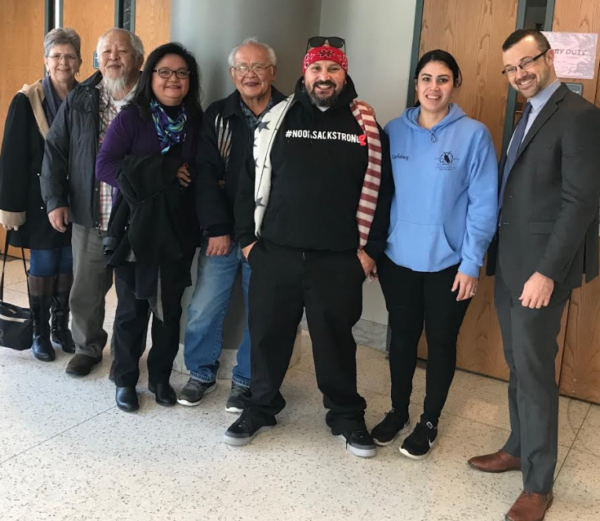
- Details
- By Press Releases
Whatcom County District Court Dismisses Criminal Fishing Charges Against Four Nooksack 306 Members “In The Interests of Justice”
From Press Release
BELLINGHAM, Wash. – Last Thursday, the Whatcom County District Court dismissed criminal charges against Michael, Francisco, James, and Lisa Rabang for subsistence clamming outside of Bellingham, Washington last May without a state recreational shellfish license. The Rabangs are part of the extended family of purportedly disenrolled Nooksack Indians commonly known as the Nooksack 306.
The Rabangs argued to the state court that because they were never lawfully disenrolled by the Nooksack Tribe, they still enjoy Treaty rights to fish in usual and accustomed Nooksack fishing places. Under federal law, those Treaty rights include the right to take shellfish without a state license and those Treaty fishing grounds include the Semiahmoo Spit, where the Rabangs were criminally cited by the Washington State Department of Fish and Wildlife last spring.
The District Court dismissed each of the charges “in the interests of justice.”
“My clients have steadfastly maintained that they have never been lawfully disenrolled from the Nooksack Tribe and a state court judge now seems to agree with them,” said Gabriel S. Galanda, the Rabangs’ criminal defense lawyer. “They have always been and will always be Nooksack.”
In 1855, the Nooksack Tribe signed the Point Elliott Treaty, which guaranteed Nooksack Indians “the right of taking fish at usual and accustomed grounds.” Washington State recognizes Semiahmoo Spit as one of several usual and accustomed Nooksack fishing areas.
 The Rabangs with Corin La Pointe-Aitchison of Galanda Broadman
The Rabangs with Corin La Pointe-Aitchison of Galanda Broadman
Despite its status as a Treaty signatory, the Nooksack Tribe did not obtain federal recognition until 1973, at which time they began to enroll Tribal members. The Rabangs have been enrolled with the Nooksack Tribe dating back to the early 1980s.
The Nooksack Tribal Council proposed that the Rabangs be disenrolled in February of 2013, but a series of Nooksack trial and appellate court and federal administrative court injunctions and stays prevented the disenrollment.
A group of holdover Tribal Councilpersons purported to disenroll the Rabangs anyway, in November of 2016. But the Federal Government interceded.
In late 2016, U.S. Department of the Interior Principal Deputy Assistant Secretary of Indian Affairs Lawrence Roberts issued three decisions that operated to invalidate the purported disenrollment activity. Those decisions were never withdrawn by Interior; they stand today.
By March of 2018, a newly constituted and recognized Tribal Council again attempted to disenroll the Rabangs, even though disenrollment remained frozen by the tribal and federal courts. Those injunctions did not lift until April of 2019, if at all.
Having not been since disenrolled, the Rabangs exercised their Nooksack Treaty fishing rights by harvesting clams at Semiahmoo Spit during the early evening on May 10, 2019. When a law enforcement officer approached them and asked if they had state shellfish licenses, the Rabangs produced their Nooksack enrollment cards instead and explained they were subsistence clamming.
The officer reported that James Rabang “stated ‘no’ they do not to have any permits to harvest for subsistence.” It seems the Rabangs were right.
More Stories Like This
Native News Weekly (August 25, 2024): D.C. BriefsNavajo Nation Mourns the Passing of Former Vice President Rex Lee Jim
Deb Haaland Earns Endorsement From Communications Workers of America Local 7076
University Soccer Standout Leads by Example
Two Native Americans Named to Democratic Congressional Campaign Committee's“Red to Blue” Program
Help us defend tribal sovereignty.
At Native News Online, our mission is rooted in telling the stories that strengthen sovereignty and uplift Indigenous voices — not just at year’s end, but every single day.
Because of your generosity last year, we were able to keep our reporters on the ground in tribal communities, at national gatherings and in the halls of Congress — covering the issues that matter most to Indian Country: sovereignty, culture, education, health and economic opportunity.
That support sustained us through a tough year in 2025. Now, as we look to the year ahead, we need your help right now to ensure warrior journalism remains strong — reporting that defends tribal sovereignty, amplifies Native truth, and holds power accountable.
 The stakes couldn't be higher. Your support keeps Native voices heard, Native stories told and Native sovereignty defended.
The stakes couldn't be higher. Your support keeps Native voices heard, Native stories told and Native sovereignty defended.
Stand with Warrior Journalism today.
Levi Rickert (Potawatomi), Editor & Publisher
